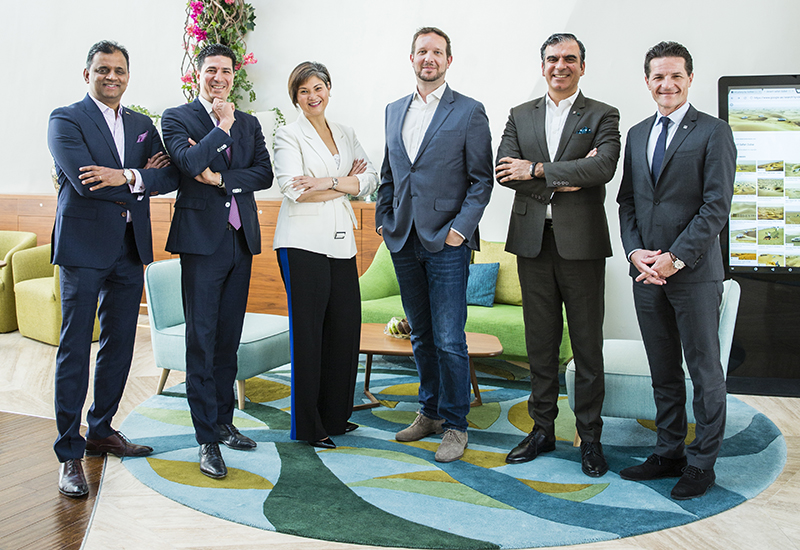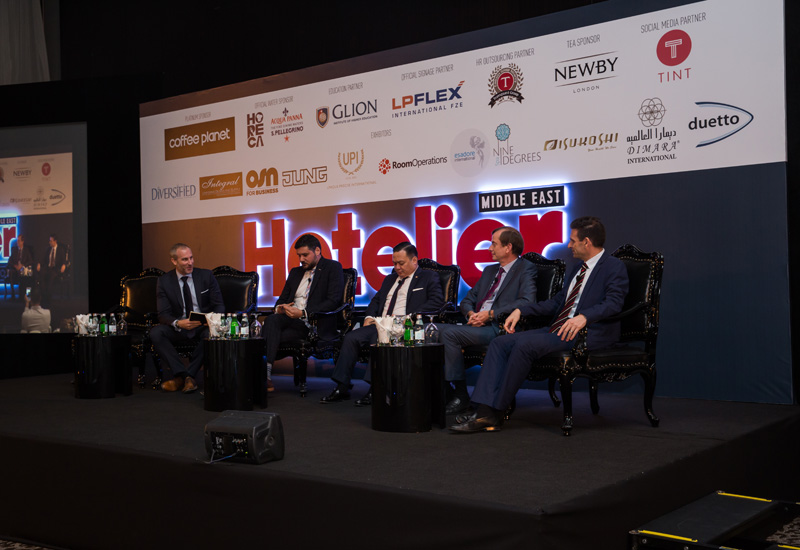 (From L-R) Siddhartha Sattanathan, General Manager, Radisson Blu Hotel Ajman; Omar Souab, General Manager, Fairmont Fujairah Beach Resort; Patria Puyat, General Manager, Holiday Inn Dubai Festival City; Andreas Plum, General Manager, Aloft Al Ain; Samir Arora, General Manager, The Retreat Palm Dubai MGallery by Sofitel and Olivier R. Harnisch, Chief Executive Officer, Emaar Hospitality Group.
(From L-R) Siddhartha Sattanathan, General Manager, Radisson Blu Hotel Ajman; Omar Souab, General Manager, Fairmont Fujairah Beach Resort; Patria Puyat, General Manager, Holiday Inn Dubai Festival City; Andreas Plum, General Manager, Aloft Al Ain; Samir Arora, General Manager, The Retreat Palm Dubai MGallery by Sofitel and Olivier R. Harnisch, Chief Executive Officer, Emaar Hospitality Group.
HOTELIER: Emiratisation was briefly mentioned at the start; can you talk more about that?
OLIVIER: We have an opportunity as an industry to take it on practically. What do we do as hotel companies to increase the number of Emiratis in the business? We need to do this collectively, because the image of hospitality is not great for Emiratis. There is a misperception about the business because — not just Emiratis — people everywhere associate the hotel business with four jobs, cooking, serving, reception and cleaning, whereas a big hotel has 50 different jobs so we need to convey that. We are going to schools and presenting the hospitality industry to high school students to show to them that it’s a super attractive industry. It’s more than cooking and cleaning, it’s much more. The percentage of Emiratis in the industry is so low. Tourists coming to the UAE expect to see UAE nationals.
PATRIA: IHG also goes into schools. Our owners also have schools, so we have a lot of the ladies and gentlemen come and train with us in internships for two months or a summer. We accept Grade 11 and 12, and they go into IT, marketing, sales; there are many options.
OMAR: I have one Emirati with me on the team and he is my link with the authorities and the local community, and they help a lot. It’s a great addition to the team and if we manage to get a bit more across departments…
SAMIR: Because there is a minimum salary you have to offer, is it feasible?
OLIVIER: Yes it might be a little more expensive but the difference is not as big as people say. To go back to your point Patria, we had a presentation at a school recently and from there we got 13 direct applications for internships this summer — they said they had no idea [about the industry] previously. So it shows we have work to do.
ANDREAS: You get a lot of credibility from having a UAE national.
OMAR: I agree that we should be pro-active because if we’re not, it will be imposed, and if it’s imposed then you don’t get the right talent.
HOTELIER: Let’s talk Expo 2020. Any challenges or opportunities you foresee during that time period?
OLIVIER: I don’t think filling rooms will be a problem; our concern is increasing room supply. Demand will be so high, the Expo expects 25 million over a six-month period, which is tremendous, so how can we accommodate all this demand? Some will come through apartments for sure. But that’s not going to be enough. The increase in number of hotels is also not going to be enough. Will we need to bring in cruise ships to provide rooms for short term demand? Six-month period, 25 million visitors, 70% international. We need to prepare for that.
PATRIA: The influx of tourists is not an issue. What are we talking after that? What occupancies are we looking at, what rates are we looking at?
SAMIR: We have good convention infrastructure in the city. That’s one area we should probably look at.
OLIVIER: My opinion is that the long-term impact of Expo 2020 is going to be good for the city. In many ways Dubai is still an emerging city since it’s the fourth most-visited city in the world. The supply growth has been as it has in the past. Talks of oversupply have been around for 10-15 years.
And look at the tremendous opportunity now provided by the transit visa; now that everyone can get a 72-hour visa at the airport and Dubai is the biggest transit platform in the world.

| Advertisement |









 Search our database of more than 2,700 industry companies
Search our database of more than 2,700 industry companies









